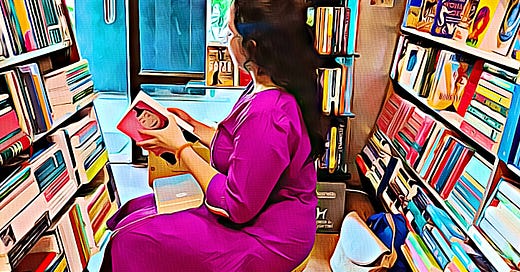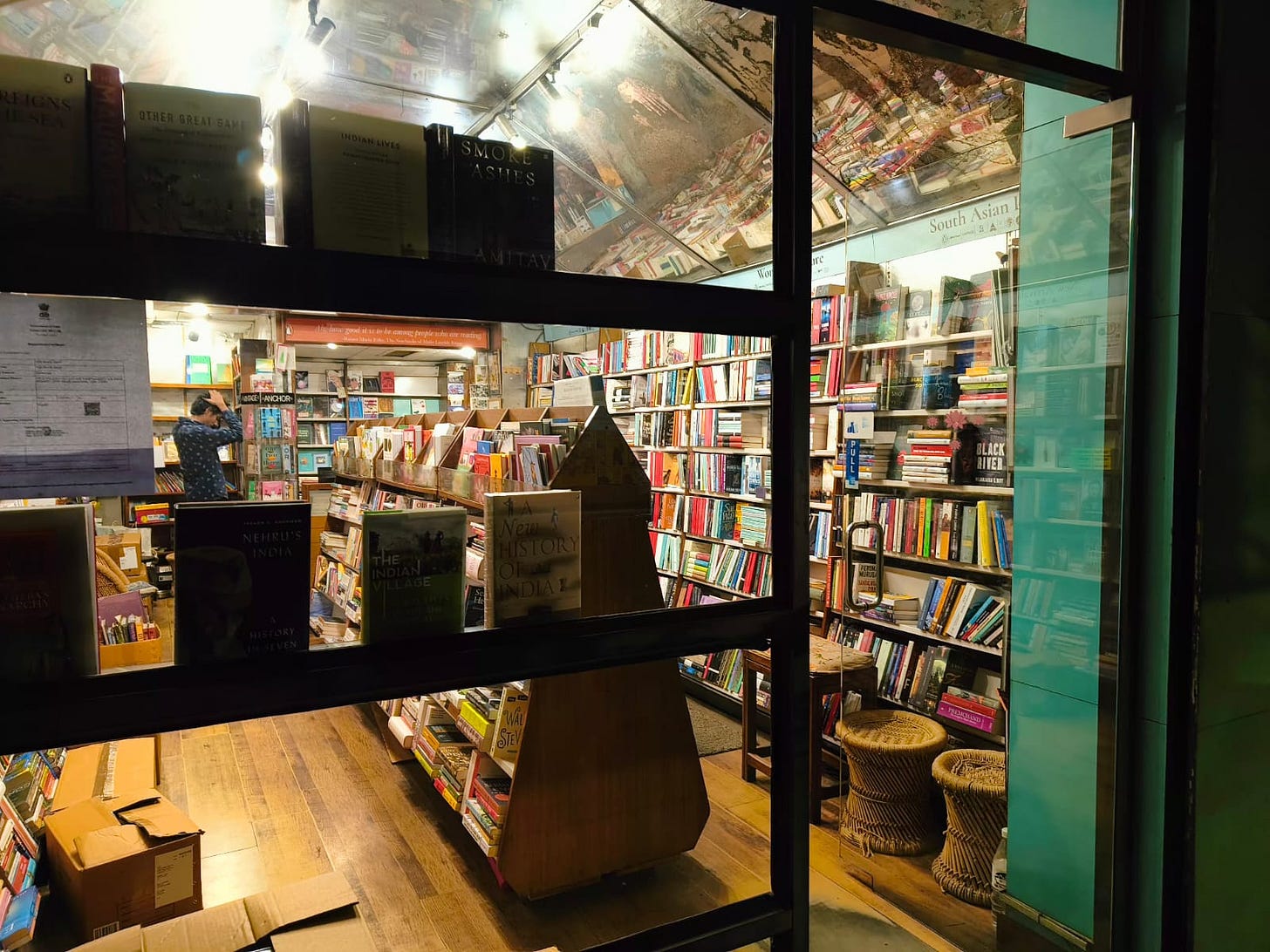An ode to bookshops
All bookstores archive our unreliable memories, be it Patna's Books-N-Amee (or Books Enemy as I foolishly believed), Lucignana's Bookshop on the Hill or The Bookshop and Kunzum in New Delhi.
1. A city with no bookstores
I grew up in a city where bookstores didn’t exist. ‘Bookstores’ came attached with a stationery shop and a mini kirana; stationery shops fronted as a bookstore, with the cash counter serving as a kirana. But kirana shops rarely needed books or stationery to function — in our city of big aspirations, hungry mouths and omnipresent thefts, utility was of utmost importance.
Leisure browsing was always off the table. Books were tucked firmly on shelves behind a wall-to-wall counter, manned by a jovial or surly pot-bellied man, depending on what time of the day it was. Their ‘popular books’ section consisted of stacks and stacks of school textbooks (at least you could rely on them to be always in demand). An assortment of pens, pencils, scissors and chart papers lay proudly in the display case, a signal that the bookstore was so much more. A bribe of chocolates or chips was the only right way to drag children to these havens, as parents haggled over prices. The last thing that bookstores in my city sold was a delight for reading.
The most popular bookstore ‘chain’ in Patna was called Books-N-Amee (it had two stores, if memory serves me correctly). Say it out loud, over and over, and you realise it’s a tongue twister — Books-N-Amee, Books-N-Amee, Books-Enemy. I couldn’t figure out why a place called Books-Enemy would sell books.
I posed the question to the owner once, my eyes ripe with innocence and curiosity. He pointed at a signboard, perpetually hidden by the shelters (how was a child to really know?). It screamed Books-N-Amee in bold, white cursive, against a midnight blue backdrop (perhaps, as always, I’m exaggerating). To be fair, Books-N-Amee did try to cultivate a culture of reading. But when has time ever been a friend?
It’s no surprise to me that most of these bookshops have shut down. The only one that remains standing, despite the pandemic, is a Books-N-Amee store perched on the most popular and happening street in Patna — Boring Road (yes, you read it right). A few months ago, I couldn’t help but wonder who Amee was, curiosity gripping me once again. On a lazy Sunday morning, a friend helpfully suggested — perhaps its a play on ‘Ammi’ (mother). I found it difficult to buy the argument; a foreign, mysterious ‘Amee’ would definitely have more takers than Ammi, whom we dealt with everyday.
2. A chance encounter
Bookstores may not have found a space in our city of over 2.5 million. But in a remote village of Italy, sits the bookshop of my dreams.
And so began the fairy tale of Libreria Sopra la Penna. I first encountered this ‘Bookshop on a Hill’ in the owner, Alba Donati’s book, Diary of a Tuscan Bookshop. If losing their minds creates such beauty, I hope more women lose their minds. Alba’s meticulous accounts present how nurturing the bookshop really was, be it in its creation, in its maintenance or in its ability package ideas with care and deliver them to readers, especially young girls.
Meanwhile Patna, and Bihar, are not just losing bookstores. Archival libraries that contain unprecedented notes of history are perishing. Loss spills in all the cracks of Bihar — even the name carries the burden of ‘harna’, of losing, of giving up. Moved by Alba’s account and unwilling to fester in loss, I picked up Elena Ferrante’s In the Margins: On the Pleasures of Reading and Writing at an outlet of Kunzum in New Delhi. At the counter, I saw an older woman waiting to bill a copy of Sridhar Balan’s Off the Shelf: On Books, Book People and Places. She reminded me a little of myself — pairing a yellow bag with a black outfit.
I couldn’t help but ask, ‘Do you like reading?’
She smiled at me, glimpsed at my Ferrante and said, ‘Yes, yes, I do. You are going to read a book from my country!’
‘Then you must read this book about a bookshop in a small Italian village. I couldn’t stop as I raced through it.’
‘Wait, wait! You’re talking about Alba’s store. She’s a friend. I’ll click a picture of you and send it to her!’
For a while after, we chatted about books, about the serendipity of knowing/knowing of the same person in Italy, of her buying a book by an Indian author as I bought one by an Italian. The Bookshop on a Hill — far, far away — had opened up the possibility of a community in a bookstore in India, where neither of us were regular customers. We’d found each other randomly, miraculously, poetically. But finding her reminded me of who I could not find, of a disappearance so uncanny, it makes little sense.
3. Of disappearance and memory
When my father disappeared, I wrote to The Bookshop in New Delhi. In the correspondence we shared, the people of The Bookshop sent tenderness in their emails. They shared photos, they shared a poem, and they put in a book of their own in the care package of books that my colleagues sent, while I was holed up in our not-house in Patna (a story for a different day). They sent out parcel after parcel of books about disappearances, of books about about hope and of books about writing. Around my birthday (one I share with my father and one that marked two months of his disappearance), they held me in their space, without asking, without questioning, without wondering about how my life seems to be unfolding.
A dear love once told me that I have a tendency to treat places as people. But any place worth loving is one made up of people and the kindness they spread, unperturbed by the fact that kindness is not a commodity you can sell. In the past couple of years, The Bookshop has been a refuge for S and I. We’ve held hands and walked there. We’ve spent huge chunks of our salaries on books we’ll take forever to read. Inside it’s warm lighting, we’ve allowed ourselves to heal.
On their last day in the location they’d called home for over 50 years, I spent time perusing books with people who’d created their own histories with the store. I roamed about with S on video call, and lingered till the absolute end, till the time that the place would disappear from this location, during this time. I couldn’t help but feel the loss — of the refuge that S and I shared, of the layers and layers of written word it fitted inside, of the archive of our minuscule oral histories and unreliable memories.
Too many losses are lost to the world. But they’re always archived decentrally. We will all reminisce about The Bookshop. We will visit The Bookshop Inc. and make newer histories.
My mother, brother and I remember our father in every beat of our hearts. And together we will wait for him to come back.







Your expressions always touches me deep down....And most of the time tears start rolling down unknowingly. Keep on writing, keep on expressing...It will definitely give you some respite. Love you to the moon and back. ❤️❤️